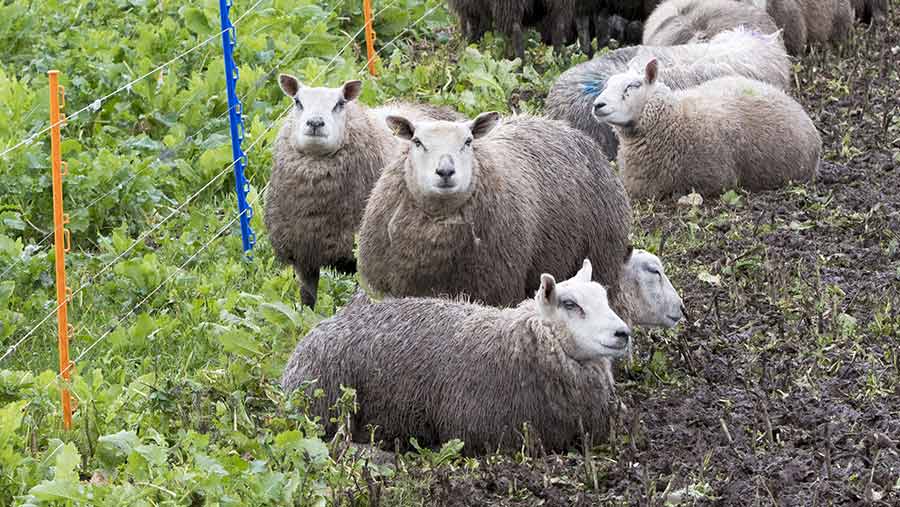Advice on testing your flock for fluke after wet weather
 © FLPA/Shutterstock
© FLPA/Shutterstock Extended wet weather can increase the incidence of fluke disease in sheep flocks.
Local conditions and individual farm situations will dictate the appropriate course of action, but sheep specialist Emily Gascoigne from Synergy Farm Health stresses that farmers must not act in ignorance.
Wet conditions favour liver fluke as water is needed for the host mud snail to thrive and for the parasite to hatch out of faeces and the snail.
Ms Gascoigne says the test and flukicide a flock requires depends on the stage of fluke. “The most important thing is that farms confirm there is active and cycling fluke on the farm and that they then use the right product.
“We are seeing more liver fluke at the moment and have seen it in the acute form, but we’re also seeing flocks free of fluke because farmers have treated ewes properly and optimised pasture use through the year.”
See also: The risks of using rafoxanide for liver fluke explained
What flukicide should I use? |
||||
|
Disease stage |
Peak incidence |
How to spot it in your sheep |
Eggs/ gram (FEC) |
Treatment |
|
Acute |
July-December |
Sudden death, dullness, laboured breathing, abdominal pain/fluid |
0 |
Triclabendazole for immature fluke; move to drier pasture |
|
Sub-acute |
October-January |
Rapid weight loss, swollen jaw, abdominal fluid |
<100 |
Triclabendazole will also work here, but if you know the fluke is older than seven weeks, your vet might recommend Nitroxynil or Closantel |
|
Chronic |
January-April |
Further weight loss, diarrhoea, swollen jaw, abdominal fluid |
100+ |
Fluke are older and Albendazole and Oxyclozanide are also available |
|
Source: Sustainable Control of Parasite in Sheep |
||||
Act to prevent losses
Testing should be the first step in a bid to prevent losses, according to vet Ben Strugnell of Farm Post Mortems, County Durham.
He says farms that have scanned ewes and noticed sheep in poor condition or with disappointing scanning results should consult with their vets about liver fluke.
“Where I work in the north-east of England, we aren’t a high liver fluke region on the whole, so when I start seeing it more often, like this winter, I consider it quite significant.”
Is fluke responsible for my poor scanning results?
- Fluke can be responsible, but abortion pathogens, border disease, sheep scab, tup infertility, body condition, trace elements and lameness could all be to blame.
- This is why it’s worth testing to ensure flukicides are necessary.
How can I test for liver fluke?
Sheep only test positive for liver fluke through egg tests 10-12 weeks after fluke have been ingested, because it typically takes 10-12 weeks for fluke to produce eggs.
Therefore, sheep still at pasture could have ingested the fluke (metacercaria) more recently, meaning faecal egg counts (FECs) could test negative despite sheep actually being infected.
Liver fluke testing methods |
||||
|
Test |
How it works |
Positives |
Negatives |
Cost |
|
Abattoir data kill sheet |
Infected livers are rejected, showing whether fluke are adult or immature This is often reported in the health summary at the bottom of the report |
Good way of screening cull sheep leaving the flock and lambs |
Only works on deadstock and on animals sold deadweight |
Usually free |
|
Blood test |
A serological test looking for antibodies to the fluke |
Can be useful on incoming stock or on untreated lambs Detects antibodies two to four week’s post infection
|
Infection levels rise and fall over time and animals remain positive for many months after successful treatment |
£8/test at commercial laboratory |
|
Copro-antigen test |
Tests faeces looking for younger fluke by looking for evidence of intermediate stages of fluke |
Only 0.5g of faeces is needed Works two to four weeks post infection Can detect fluke infection two to three weeks earlier than faecal egg counts |
Coproantigen levels can vary daily |
Test costs vary from small samples (1-9) at £11.20 to 10+ at £8.80 – some labs charge up to £18.50 |
|
Faecal egg count
|
Sedimentation test counting eggs in faeces |
Collecting faeces is relatively simple and results can be back in two days |
Only adult fluke produce eggs Counts are low when burden is low and numbers can fluctuate daily |
Bulk egg checks cost about £25-£30. Individual checks cost about £9.60 on four or more samples |
